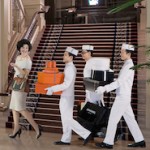From material to experiential
The luxury travel market in China is booming today, thanks in part to the growing desires of affluent Chinese to not just own the most expensive products, but to savor unique experiences around the world
The 410-square-meter presidential suite on the 51st floor of the Ritz-Carlton Hotel in Pudong might have housed some of the most lavish parties in town before, but on this particular Monday morning, it played host to an extravagance of a different kind.
With the iconic Oriental Pearl TV Tower anchoring the stunning backdrop, four ladies in exquisite qipaos played the traditional Chinese game of mahjong in a reenactment of the leisure life of rich wives from Shanghai’s 1930s, a golden period when the city earned its reputation for being the Oriental Paris.
This scene was part of the launch of the 10th International Luxury Travel Market (ILTM) Asia, one of the region’s leading trade events for luxury travel that is exclusive to members of the media and buyers from luxury travel agencies.
Held at the Shanghai Exhibition Center, the event this year gathered upwards of 500 exhibitors from 53 countries and 480 buyers from 19 Asian countries. Event organizers said that the number of buyers — made up mostly of private travel agencies and concierge companies — grew 5 percent this year. The increase in the number of Chinese buyers, who accounted for about 40 percent of the total, was the most significant at 10 percent.
“This event is certainly not about playing mahjong. Rather, it is about illustrating the experiences of luxury travel,” said Edward Yuan, director of sales and marketing at Ritz-Carlton Pudong which recently started offering qipao-tailoring services in collaboration with one of Shanghai’s most famous tailors.
“Here at the Ritz-Carlton in Shanghai, we want to offer customers a luxury travel experience that is a combination of modernity and history; a mix of elements from old Shanghai and the cosmopolitan city we know of today.”
The main takeaway from the May 30 to June 2 event, which was run by UK events organizer Reed Exhibition, was how Chinese luxury travelers have rapidly evolved over the years. Yuan recalled that when he first joined the luxury hotel brand, the three key words in hotel reviews by Chinese travelers were “price”, “lobby” and “location”. Today, the words are “services”, “experiences” and “happy”.
“Ten years ago, all wealthy Chinese were seeking the same things like Louis Vuitton bags and going on holidays to places like New York and Hong Kong. Today, it’s the opposite — they want uniqueness,” said Amrita Banda, managing director of Agility Research & Strategy, the partnering consultancy of ILTM Asia.

 Previous Post
Previous Post
